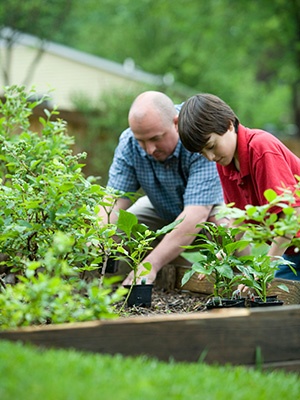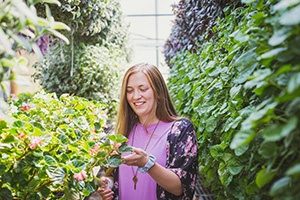Gardening for Wellness

There are a variety of reasons why one may decide to start a garden or build a beautiful landscape. It could be a passion for plants, a desire for a welcoming home, or a need to grow food. But spending time in nature and getting our hands dirty provides so much more. Working in your garden or landscape yields a plethora of health benefits and can be a major factor in boosting your quality of life. Read on to learn about a few of the benefits that you may be reaping from your gardening passion.
Reduced Anxiety and Stress
In today’s whirlwind society, we’re always looking for ways to decrease anxiety and stress. One way to do that is by spending time outside. Even just sitting in a park and enjoying the scenery or going for a walk in the woods can help with mental fatigue and reduce stress. There is a positive correlation between tree density and stress recovery, so the more trees the better!
For those of us who are stuck inside for most of the day, having indoor plants can help too. It’s been proven that looking at indoor plants can increase attention spans, lower stress, and boost work satisfaction. Unpleasant environments take more brain power to process than pleasant environments, which explains why we feel calmer and have a greater mental capacity when we view plants and nature scenes.
Better Memory

Research has shown that people have a better working memory after walking through a green arboretum than they do after walking through a busy urban area. Nature exposure boosts memory and attentiveness in children as well.
Greater Happiness
Interacting with nature is so powerful that it can raise self-esteem, lower anger, and boost positive emotions or behavior. The presence of water further promotes these benefits. As this relates to lifestyles, people who are more focused on nature and sustainability tend to have a more positive outlook and be more satisfied with their lives than those who prioritize nature less.
Interestingly, more biodiversity is also connected to personal and community well-being. There are plenty of other reasons to have a biodiverse landscape (such as benefits to wildlife), but research is also showing that it’s better for people, too. We mentioned previously that greater tree density is better for stress. Well, it’s also better for our perceptions of our health in general. A block with 10 or more trees, on average, causes personal health perceptions to improve in ways proportional to a $10,000 raise or being seven years younger¹. If you’re feeling inspired by that statistic, then you can start researching Florida-Friendly trees to add to your yard.
Increased Creativity
Humans have been inspired by nature for as long as we’ve existed, but did you know that spending time around plants elevates creativity in general? If you work in a team, you can try outdoor “walking meetings” to help with brainstorming. Given nature’s effect on brain function, it’s no surprise that increased creativity is a byproduct.
Higher Productivity and Attention

If you find it hard to pay attention and stay productive at your job or during projects at home, greenery may help. The combination of nature views plus sunlight streaming in is linked to higher productivity and attention span. Viewing plants reduces stress, so this frees up more brain power for getting through your to-do list. In addition, the air-purifying qualities of plants and the fact that they release moisture into our dry indoor air helps with physical health. The better we feel, the easier it is to focus.
Now that you know more about what plants and gardening are doing for us, think about what you can do to better harness these benefits. Do you have a space where you can take a walk each day? Are there any houseplants that you can add to your home or workspace? Do you have a few more hours that you can devote to interacting with your garden or landscape each week? As we’ve learned, the more you focus your life on nature, the more nature can do for your personal wellness.
Also on Gardening Solutions
- Accessible Gardens
- The Benefits of Trees in the Landscape
- Gardening to Heal
- Gardening with Kids
- Sanctuary Gardens
- More “Outdoor Living” articles
Source
This article is based on the publication below. We recommend reading it if you would like to dive deeper into the latest research on gardening for wellness.
1. Charles Hall, Melinda Knuth; An Update of the Literature Supporting the Well-Being Benefits of Plants: A Review of the Emotional and Mental Health Benefits of Plants. Journal of Environmental Horticulture 1 March 2019; 37 (1): 30–38. doi: https://doi.org/10.24266/0738-2898-37.1.30
More on Children and Nature
If you’re interested in the connection between health and nature for youth, then check out these resources as well:
- Tillmann S, Tobin D, Avison W, et al. Mental health benefits of interactions with nature in children and teenagers: a systematic review. J Epidemiol Community Health 2018;72:958-966. doi: https://doi.org/10.1136/jech-2018-210436.
- American Psychological Association. (2020, April 1). Nurtured by nature. Monitor on Psychology, 51(3). https://www.apa.org/monitor/2020/04/nurtured-nature. (Accessed 01/04/24).
- Summers, J. K., Vivian, D. N., & Summers, J. T. (2019). The Role of Interaction with Nature in Childhood Development: An Under-Appreciated Ecosystem Service. Psychology and behavioral sciences (New York, N.Y. 2012), 8(6), 142–150. PMCID: https://www.ncbi.nlm.nih.gov/pmc/articles/PMC7424505/.
